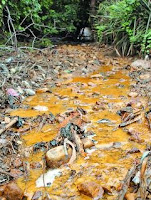
This morning, three large trucks carrying a total of 150 soldiers armed with heavy artillery entered the community of El Papaturro, in the zone of La Bermuda, Suchitoto. The soldiers have set up a military camp and said that they will be in the community for the next three days doing "military maneuvers." The mayor of Suchitoto has called the police and regional military base, and has been given no further information about the soldiers.
This act of aggression comes after the Salvadoran government recently declared that it as intelligence of secret armed groups active in various parts of El Salvador, including the region of La Bermuda, Suchitoto. Although the government continues to speak about these groups, which they link to the opposition party, the FMLN, they have shared no evidence to prove their existence. The government has implied that these supposed groups are a revival of guerrilla soldiers from the Civil War, and a threat to the Salvadoran military.
The community members of Papaturro and the Association for the Development of El Salvador, CRIPDES, believe that the government is claiming the existence of armed groups in order to cause fear in the population and provoke violence. This actions comes one month before the January municipal elections in El Salvador, and the FMLN continues to lead in the polls for both the presidential and municipal elections, threatening 19 years of dominance by the governing party, ARENA.
Community members in Papaturro worry that the military has entered the community in order to try to provoke conflict or set up a situation to make it look like community members are part of secret armed groups. Community leader Francisco Martinez said, "All the military has to do is put machine guns in a cave, and then come back and photograph them. They have taken photos of us while we were at marches or other activities, and it would be easy to change these photos on a computer and publicize them in the press." Many people connect today's situation to the case of the Suchitoto 13, when the government tried to provoke violence in the same region on July 2, 2007.
The idea that secret armed groups would operate in Papaturro is seen by community leaders as completely unreasonable. Vilma Castillo, representative of the Papturro community directive said, "In our community, parents explain the history of the war to their children. We don't want to return to the war and parents tell their children that. There is no reason that there would be armed groups here."
Community members in Papaturro report that the entrance of the soldiers into this small community has caused panic and fear within the population. For many the presence of so many soldiers brings back the trauma of military attacks on civilians during the El Salvador's civil war. Along with fear within the population, community members say that the soldiers have destroyed their property, such as fences around their farmland and the products that were growing on their farms.
This afternoon the community of Papaturro held an assembly with over 200 participants, where they created a community strategy to respond to the military presence.
The Ombudsman for Human Rights, Coalition for Human Rights, Mayor of Suchitoto, and members of the National Press were in the community today, documenting the situation.
- US-ES Sister Cities
- Posted by Sara Skinner, US Grassroots Coordinator
 According to an article in the Washington Post today, the Metro DC Latino communities are suffering this holiday season due to the crippling economic recession. Day laborers and construction workers have been hit particularly hard as service industries are scaling back and construction is coming to a standstill. Latino-owned small businesses are experiencing major setbacks as many of their clients have lost their jobs.
According to an article in the Washington Post today, the Metro DC Latino communities are suffering this holiday season due to the crippling economic recession. Day laborers and construction workers have been hit particularly hard as service industries are scaling back and construction is coming to a standstill. Latino-owned small businesses are experiencing major setbacks as many of their clients have lost their jobs.















